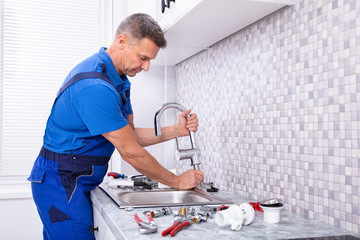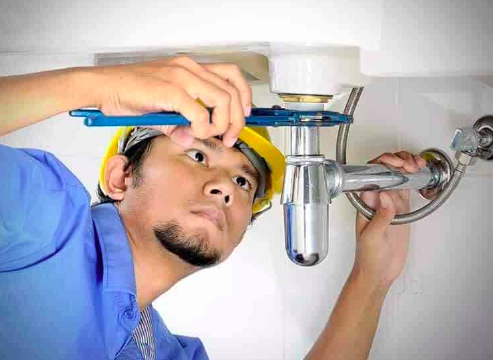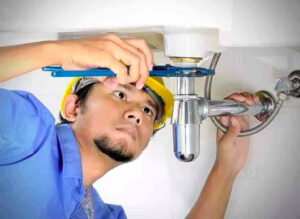Plumbing is the system of pipes, fixtures, and appliances that deliver clean water and remove waste in homes and businesses. Plumbers use their knowledge of building codes, materials, and installation techniques to create and maintain these essential systems.
Local regulations differ from state to state, but most establish safety, health, and environmental standards that must be adhered to for plumbing work to be approved. Contact Plumbing Express, Inc. for professional help.
A standard tank-type water heater is a large insulated tank that holds your hot water at a fixed temperature until you need it. These tanks come in different sizes and can be fueled by gas, oil, propane, or electricity. Water enters the tank through a dip tube, and a heating mechanism inside the tank (either a flame or electric elements) heats the water to your desired temperature. The hot water exits the tank through a heat-out pipe and travels through your home’s hot water supply pipes to your faucets or appliances. As the hot water is used, cold water enters through the dip tube and replaces it in the tank. The tank is usually rated for a certain number of gallons, which means the tank will empty out as you use hot water and refills when you turn on your taps.
The duration for which the water remains hot depends on how insulated the tank is, how much water is in the tank at any given time, and the setting on your thermostat. It is also important to know that your water heater burns energy day and night to maintain the temperature of the water in the tank, even when you’re not using any hot water, a phenomenon known as standby heat loss.
When you turn on your hot water tap, a flow sensor activates the heating element or flame in your tank and heats it to your desired temperature. The water in the tank is displaced by the new hot water, and the hottest water rises to the top. The hot water leaves the tank through a hot-water tap and flows into your household plumbing.
Another type of hot water heater that’s becoming more popular is a tankless model. These units sit idle until you open a hot water tap in your house, at which point they start working. The flow sensor activates an electric heating element or gas burner, and the water passes over it, warming to your preferred temperature. This displaced water then travels through the heat exchanger to the hot-water tap, and the heated water is delivered to your home’s plumbing system. As this process continues, the combustion gases are vented through a flue pipe.
Water Heater with a Thermostat
A water heater’s thermostat is responsible for heating the water to a specific temperature. This important function helps ensure that hot water is available as needed without overheating the water.
While a faulty thermostat may seem innocuous, it can cause significant issues with your home’s hot water supply. At Intown Plumbing, we provide expert repair services for water heater thermostats to prevent hot water outages and ensure reliable temperature control.
Electric water heaters typically have either single or dual thermostats to control the heating elements in the tank. These thermostats monitor temperatures within different areas of the tank and activate the heating elements when required, ensuring a constant hot water supply at the desired temperature. Professional water heater thermostat inspections and repairs help reduce energy consumption risks and optimize heating efficiency.
Located on the front of an electric water heater, the thermostat is connected to its heat source and resembles an adjustable dial. It usually has a small black line or an arrow above it with the current setting. A water heater’s thermostat should be set somewhere between 105 and 120 degrees Fahrenheit to avoid the risk of scalding or tank explosions.
In addition to adjusting the temperature, your water heater’s thermostat also functions as a safety device to prevent electrical shock or tank explosions. It includes a high-temperature limit device that shuts off the power elements if the temperature reaches 150 degrees Fahrenheit, which can cause severe burns. Regularly checking the upper and lower thermostats can help identify issues with them, such as if they’re not functioning properly or are set too high.
Thermostat Testing
To test a water heater thermostat, you’ll need a simple multimeter, a screwdriver and some basic supplies. First, you’ll need to turn off the power to your water heater by turning off your home’s circuit breaker. You should also shut off your water heater’s gas line to prevent a dangerous leak.
Next, you’ll need to locate the access panel for your water heater (if it has one). If the panel is insulated, you’ll need to remove the insulation and use a screwdriver to open it. Once you’ve opened the panel, place the meter probe on each of the thermostat’s terminal screws and note the reading. The higher the reading, the more likely the thermostat is faulty.
Water Heater with a Pump
If you’re looking to upgrade your old, gas powered water heater in Brookline or you’re considering an electric alternative that will save energy, consider a recirculating pump. Recirculating pumps work by keeping a small amount of hot water in your pipes at all times, so that you can use it when you need it without waiting for it to heat up. The energy savings from a recirculating pump can be substantial, and it can help to keep your energy bills lower, even in a cold climate like ours.
Heat pump water heaters (HPWHs) use the same technology as space heating systems to transfer heat from the air into your home’s water system. Some models come with an internal tank with back-up resistance heating elements, while others work as an adjunct to an existing water heater. A heat pump water heater can save up to 15% in energy costs, and a few factors are important to consider when selecting one.
For example, you’ll want to size the unit to meet your household’s usage needs and assess the first-hour rating to determine how many gallons of hot water the unit can supply in an hour before it must reheat itself again. And you’ll need to select a mechanical room for the HPWH that’s well-insulated to keep operating sound levels low.
Xcel Energy’s Mass Save program offers rebates for heat pump water heaters, as do local utilities. You’ll also want to check out the NW Energy Efficiency Alliance’s Advanced Water Heating Specification, which tests and certifies heat pump water heaters that are optimized for the Northeast’s climate. In addition to testing and certification, the specification offers guidance on how you can optimize your water heater for greater savings, such as installing low-flow showerheads and faucets and insulating hot water pipes.
Water Heater with a Filter
A water heater with a filter helps ensure consistent supply of hot water for your household needs. By catching pesky minerals before they can cause damage to the unit, it prolongs its lifespan and enhances your water quality. Additionally, it lowers maintenance needs and costs by preventing scale, which also saves you energy by reducing the amount of heat that is required to produce hot water.
It is important to regularly clean your water heater’s air filter. This is typically a black mesh ring located on the bottom of your tank. Over time, dust can collect on the filter and prevent it from effectively circulating air to the heater, which causes it to work less efficiently. To clean your filter, simply remove it from the heater and run it under a tap until it is empty. Then, simply screw it back onto the heater.
The temperature and pressure relief valve on your water heater should be installed per the manufacturer’s recommendations. It is recommended that the discharge line from this valve should terminate within 6 inches of a floor drain to prevent discharge water from contacting people or electrical parts in case of an emergency.
In addition, the discharge line should be directed to a sturdy drain pan when it is located in an indoor environment, especially in earthquake-prone areas. This will protect the floor, nearby fixtures, and the water heater from potential corrosive water, pressure valve runoffs, or sediment leaks.





